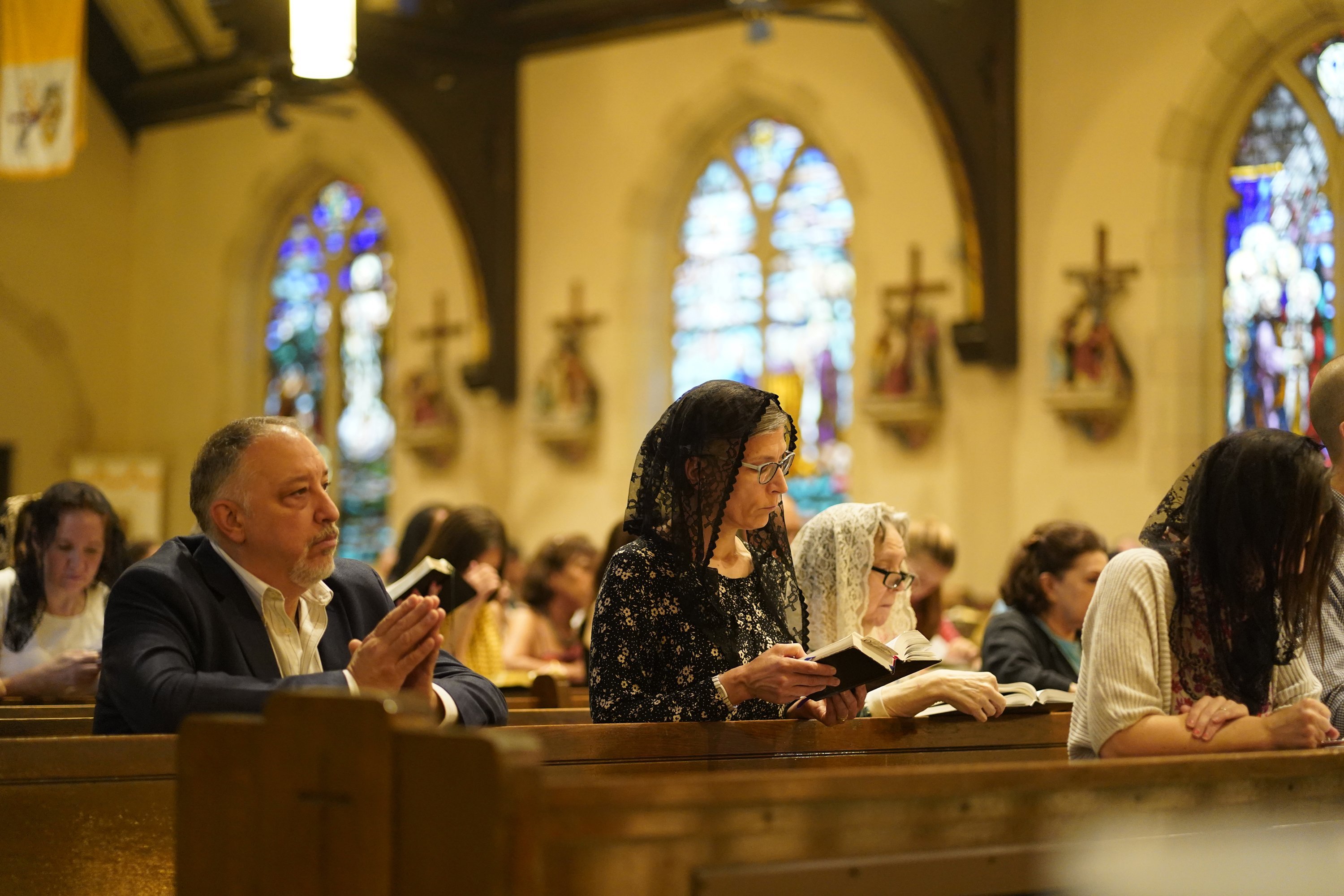The Apostolic Letter Traditionis Custodes recently issued by Pope Francis provides local bishops with new powers to regulate and restrict access of the faithful to the Extraordinary Form of the Mass. The Extraordinary Form often attracts a degree of uncertainty and sometimes hostility from those not familiar with it. This is one person’s experience of it.
In the 1986 film The Mission, the papal emissary Cardinal Altamirano is sent to report on the eighteenth century Jesuit missions in the Paraguayan jungle. He surveys the missions, learning of their work, the numbers they care for and how they have brought the faith to people. In writing about new restrictions imposed against the Extraordinary Form I am tempted to begin the same way, pointing out the number of Mass centres, the number of Catholics they care for, their extensive social and spiritual work, the good they do. Instead I will write on a more personal note.
First it is important to appreciate Catholic life in my particular part of the world. I live in the Ballarat diocese, Australia, a place devastated by the experience of sexual abuse of the laity by priests and religious. Between 1980 and 2015 there were 139 people raped by 21 abusers, 17 of which were priests, just under 10 per cent of the priest population of the diocese.
The fences of the main Catholic churches and institutions are festooned with ribbons, each symbolising the experience of an individual who was broken by this experience of sexual abuse either directly or as a friend or a family member of a victim. The current bishop, in a ritualistic manner, attempted to take down the ribbons on the fences of the local cathedral, placing them all in an iron box to be set in a memorial garden. The people of Ballarat would have none of that. It had been previous Bishops of Ballarat who had allowed the abuse to happen. They had moved priests on to new parishes when complaints of sexual abuse were received. It was part of a strategy to hush things up, placing the interests of the clergy involved before that of ordinary people. So the ribbons were put back the very next day in greater numbers. People were tired of the contempt clerics held them in and did not want the bishop to forget.
I am 52, married with two daughters, one 13 the other 17. I work as a legal advocate. My wife is 48 and teaches literature and language. We moved to Ballarat 8 years ago when the girls were 5 and 9. It was a difficult transition. We had come from a rich parish in Melbourne that was in the care of Opus Dei. Ballarat was a spiritual desert. Apart from the school Masses, attendance at Mass seem to be the reserve of the very old clinging to a culture of folk hymns I found cringeworthy even when they were first rolled out forty years ago. It seemed to be a church in a time warp, stuck in the 1980s when the enormity of the sexual scandal here first began to hit home, striking at the heart of the faith of many and killing it dead. I felt that they were no people my children’s age. We were raising them Catholic. They wanted to know why things felt so different to Melbourne. I didn’t want to lie to them but how could I explain to them that this faith I had said was a vital source of love and hope had been associated with such evil.
There was an out. A little enclave of laity that organised Masses following the pre-1970 rubrics. This was an oasis. People were open and kind. Prior to Mass there was confession and rosary. After there was cups of tea, cakes and warm hearted conversation. My girls could see these people were genuinely devout and able to take the faith they expressed so reverently at Mass into their daily lives. That was immediately clear in the kindness these people showed once they stepped outside the church into the world outside. I got involved.
During my time assisting with the pre-1970 Mass here in Ballarat I have watched it grow. It seemed to have an attraction for other young families in the same way it had had for us when were first arrived. Numbers grew. People of all sorts of backgrounds: mechanics; council workers; lawyers; physiotherapists; farmers; labourers; teachers; cleaners; nurses; students; unemployed. I have always thought that a parish is not a parish unless there is a baby crying during Mass. We have a small chorus of young people making this kind of racket. The place is vital and alive.
I have found that the Latin Mass, as they call it here, has never been popular with clergy. I have heard all sort of uncharitable caricatures described by priests about the pre-1970 ceremonies and the people who support it. They seem particularly hostile to it, especially priests who were less committed to the faith generally, or so it seems to me. But like many I tired of the performing wanna-be celebrity priests some time ago. At university, Mass had started to feel like a kindergarten assembly presided over by a fragile individual who I had to put at ease rather than someone I could turn to with my own spiritual needs. I needed to go deeper. I studied philosophy in my undergraduate degree. I began to explore different traditions that the Church had to offer. Then I came across the tridentine form. Through it I discovered the extraordinary mysticism that the Catholic tradition had to offer. I learnt about curious figures like Augustine, Roy Campbell, John Dobree Dalgairns, Huysmans and Caryll Houselander. This experience of the Mass became a spiritual anchor when my experience of the secular world was drawing me away from the Church. I attend both forms of the Mass but I remained deeply attached to the Latin Mass. It is like an old friend that has guided me through a dark time. I go to it regularly and I was not surprised in such a damaged place like Ballarat it was there offering me and my family solace.
A little about myself. I am perhaps not typical of what people think of a Latin Mass attendee. I was a student activist with a particular concern for social justice and the environment. I regularly volunteered working with the poor living on the streets. I have taken that into my work where I have worked with indigenous Australians and the socially marginalised. I ran for parliament for the Australian Labor Party, the social democratic party here. At the same time I have done work for the church having been a consultant on legal matters and presented policy submissions to government bodies on the behalf of Catholic organisations. I have attempted to live my faith as publicly and fully as possible.
The reality is I am not atypical. Latin Mass attendees come from all walks of life, from a wide variety of social backgrounds and occupations. Yet despite our differences we all come together in a wonderful spirit of fellowship as Catholics.
I would like to say as a Catholic I feel regularly cut down by the Church. I have spoken of the horror of sexual abuse. I have also seen terrible financial abuse. Parishes that families help build and gave money to at great personal expense over many years sold off without much notice and for not much money. Pastoral programs launched to great fanfare with expensive publicity ending up being an expensive waste of time for little benefit. And now the extraordinary financial scandals coming out of Rome. But the most depressing thing of all is the contempt so many clergy seem to have to the quiet devotions of ordinary people. It is difficult not to think you hate us. We have done you no harm so all they only thing I can think of to explain this animosity is a distaste for vulnerable people and the obligation to care for them. Many people hate their job after a time but this is a devastating experience for the average Catholic when it is a priest who hates their job.
Moves against the Latin Mass seems to me typical of a clerical hate towards the laity. I do not understand it. Those who attend the Latin Mass love the Church. We love God. We try to live good lives as Catholics. As ordinary people attending Mass we should be to bishops and priests nothing less than the face of Christ. I am not sure why we warrant such contempt.
At the end of The Mission the success of the Jesuit Fathers meant nothing. The missions were closed. This led to different responses. The Robert de Niro character, Rodrigo Mendoza, attempts violent resistance. Jeremy Irons’ character, Father Gabriel, choses instead to walk towards the soldiers solemnly carrying a monstrance, Christ in the Blessed Sacrament. The response of Rome was the same. Both characters are brutally pushed aside for agendas far removed from the people they cared for.



 Loading ...
Loading ...
What do you think?
You can post as a subscriber user ...
User comments (0)